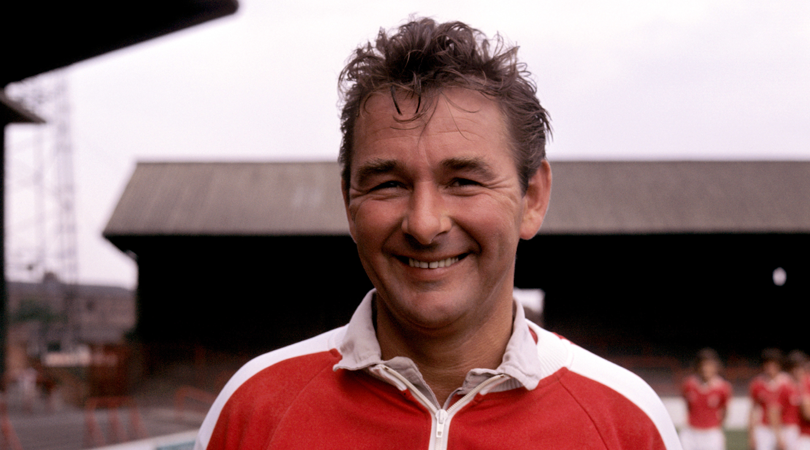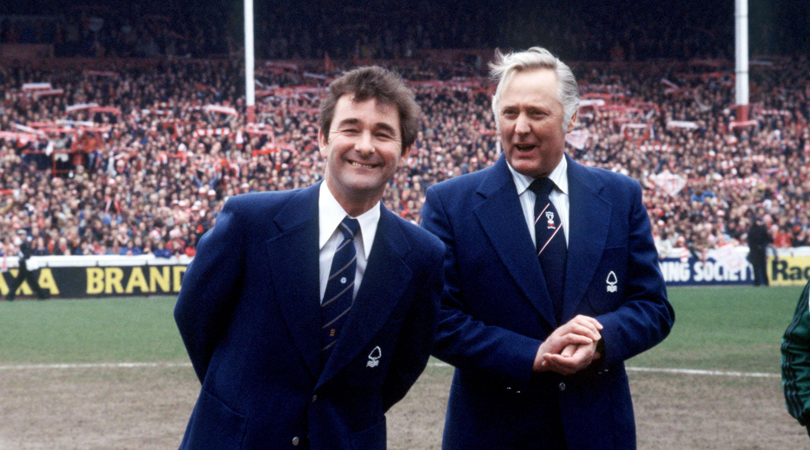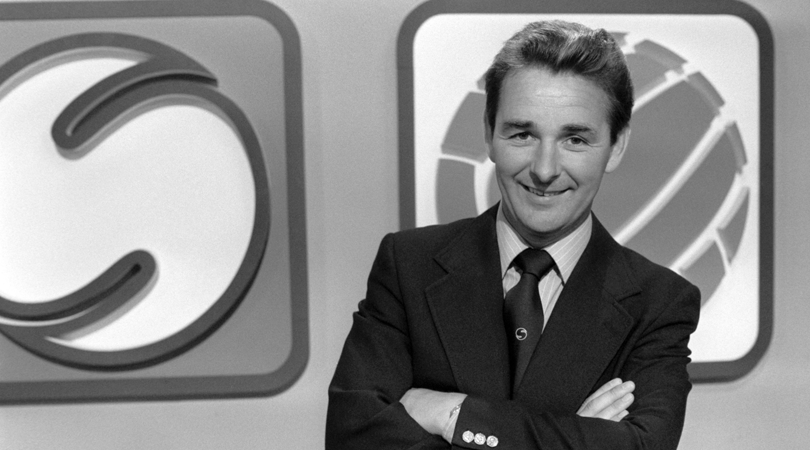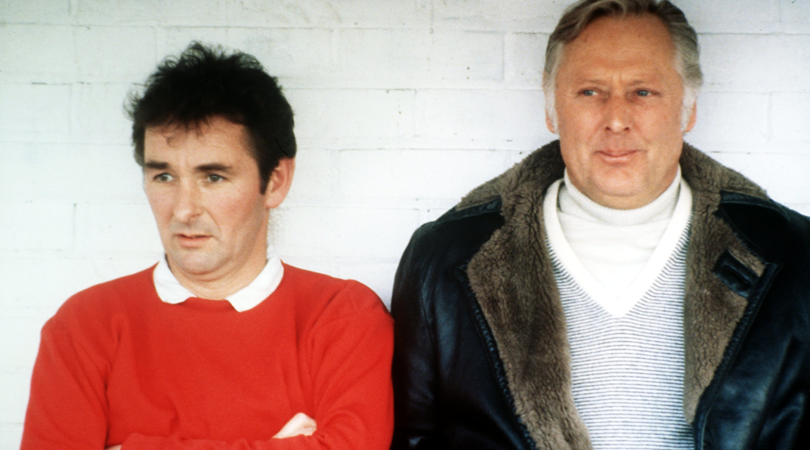Would Brian Clough have been a good England manager?
The legendary Derby and Nottingham Forest boss had an unsuccessful interview for the England job in 1977, altering the course of history forever.

The greatest manager England never had. That’s the epitaph to Brian Clough’s career. The back-to-back European Cups give it credence, and the trio of unlikely First Division championships shared between Nottingham Forest and Derby County also lend plenty of weight.
But what would Clough’s England have actually been?
That question could have been answered in December 1977. England had failed to qualify for the 1978 World Cup and Don Revie had defected to manage the UAE’s national team. The Football Association was scorned, embarrassed and – in an act of grand petulance – committed to banning Revie for ten years for bringing the game into disrepute.
But they still needed a new manager.
Ron Greenwood had been placed in temporary charge and, in his one interim game oversaw a 2-0 Wembley victory over Italy. Greenwood awarded first caps to Bob Latchford and Steve Coppell and Trevor Brooking’s first goal for his country sealed the win, but England were still eliminated on goal-difference, and the hunt for Revie’s long-term successor begun.Clough was very much the people’s choice. Understandably. His television work certainly made him the most visible personality, but among the other candidates - Dave Sexton, Jack Charlton, Lawrie McMenemy and the incumbent Greenwood - he was also the only one to have a First Division winner’s medal on his mantel.
He was a populist candidate but wouldn’t have just been a popular choice.
History records what happened next to have been a terrible mistake. Clough believed that he had aced the interview at Lancaster Gate and left assuming that the job was his. He would even tell Peter Taylor, with typical Clough understatement, that it had ‘gone magnificently’ and that ‘the job was ours’.
Get FourFourTwo Newsletter
The best features, fun and footballing quizzes, straight to your inbox every week.

By all accounts though, the decision had been made before even he set foot in the room, with it agreed beforehand that Greenwood should get the job permanently. It was a sham. A pantomime. A way of giving Clough an opportunity without actually having to.
It’s easy to fill in the gaps. He was too controversial for the FA. As successful as he had been, his talent for making enemies at boardroom level was just too prohibitive. His spectacular exit from Leeds in 1974 was still vivid in the memory, as was his acrimonious falling out with Sam Longson and his very political departure from Derby.
Clough also wore his disdain for chairmen and directors as a badge of honour. To the crusty old men of the FA, that would have been an arresting red flag. Concerning, too, would have been his habit of exploring any extracurricular work available to him, whether his employer had the same enthusiasm or not.
At both Derby and, later, at Nottingham Forest, he wasn’t shy of fluttering his eye lashes at other clubs or threatening his resignation in order to extract a new contract. In every other sense he may have been the anti-Revie, but he was far from the guarantee of stability that his prospective employers were looking for.
It’s also important to remember that in December 1977, the first of Clough’s European Cup wins was still over eighteen months away and that his sole title with Derby had been won in 1972. Forest would win the First Division the following May, but his CV at that point wasn’t as compelling as it would become.
In that regard, history does the FA a slight disservice. Their decision to overlook Clough may have been informed by self-interest and fear of being outmanoeuvred and manipulated, but it still deserves its proper context.
Nevertheless, it remains a fascinating hypothetical. Not to Clough, of course. Writing in his autobiography, he seemed characteristically convinced that he was absolutely the right man for the job.
“People wonder what kind of an England manager Cloughie would have turned out to be. There’s only one answer – a bloody good one.”
It’s what you’d expect him to say. In fact, it’s what many still believe. Clough achieved wonderful things in his club career, but the presumption of international success depends on a highly selective reading of his management style and – to an extent – wilful ignorance of his personality quirks.
In some senses, he actually was ideal for the job. He didn’t rely on day-to-day contact with his players and, because he resented the restrictions club football placed on his time with his family, he might even have enjoyed the long breaks between games. That would also have allowed plenty of opportunity for television work. Clough adored the profile punditry afforded and Longson’s attempt to curb that interest had placed early stress on what, initially, had been almost a father-son relationship at Derby.

Nevertheless, the mechanisms within his management would have caused issues. Clough depended on players submitting to him. Prior to truly establishing a trust, he required them to bend to his will. The tactics he employed towards that aim – outside of a club environment, with players who didn’t belong to him – would either have had far less effect or, worse, would have bruised egos and created the kind of scandals that the press would have feasted on.
The Clough anecdotes are legendary. He famously punched Roy Keane. He also once jabbed popinjay forward Nigel Jemson in the rib cage. His standoffs with Larry Lloyd were notorious.
Asa Hartford, who was signed by Clough and Peter Taylor to replace Archie Gemmill, remembered a dressing room on eggshells during his short time at Forest.
“Even relaxing around a lunch table, players were terrified of saying anything that might upset Brian Clough. Nobody knew what mood he was going to be in; he liked to keep people on edge.”
Hartford wasn’t at the City Ground long enough to be considered a reliable witness. He was sold just 63 days after signing, but other tales do suggest that Clough actively enjoyed tweaking his players and saw benefits in the resulting tension.
Then, as now, it’s the kind of culture which can exist within a domestic environment, where there are no divided loyalties and players are focused on a singular aim. Internationally, it would have been much more challenging. With less elasticity to relationships, perhaps Clough wouldn’t have the benefit of the leeway he depended upon.
Would he, for instance, have been able to exert the same sort of authority over Emlyn Hughes, Phil Neal and Phil Thompson, all of whom owed their place in the game to Bill Shankly, Bob Paisley and the intangibles of the Liverpool boot room.
In his autobiography, Alex Ferguson recalled his time with the Scottish national team, first as Jock Stein’s assistant and then later, as the coach who took the side to the 1986 World Cup. He described the difficulties he faced with Alan Hansen, for instance, who would withdraw from squads and return to Anfield seemingly on a whim.
Or how, searching for clues as to how to nullify Ian Rush during Scotland’s decisive tussles with Wales in the qualifying tournament, he and Stein were met with poker faces from the Liverpool contingent, who were loyal to their club teammate.
It’s an extreme example, perhaps, but it describes one of the idiosyncrasies of international football – and one which, most likely, would have irritated Clough more than most.
But there are other difficulties which are easy to foresee.
How would he have managed Kevin Keegan, by far the country’s most important player of the time and, although by that point with Hamburg, another child of the Kop. In his own autobiography, Keegan isn’t quite dismissive of Clough, but his lukewarm comments betray a different attitude towards him.
It’s a theme of sorts. Liverpool’s rivalry with Forest was yet to fully develop in 1977, but it’s hard to imagine players who had been so successful elsewhere responding to Clough in the same way as, say, John McGovern, John Robertson, Gary Birtles or Tony Woodcock.
The Leeds United saga was proof of that. The players he had inherited were fiercely loyal to Don Revie and, in a few cases, still seething over Clough’s public admonishment of the way they played. But they were also a highly successful side used to dossiers and reports ahead of games and a level of detail which was anathema to Clough.
Tellingly, when that more methodical preparation was replaced by Clough’s often absent and laissez faire approach, the results were disastrous. Bremner, Hunter, Giles and the rest didn’t respond to him for many other reasons, of course, but that ideological disconnect hardly helped and it would clearly have been a difficulty with England. Leeds, Liverpool; those were empires founded on subtleties and small advantages, not running through the nettles on the banks of the Trent.
Clearly the relationship between Clough and his employers would have become a problem, too. To a certain extent, he had to be tolerated and appeased by club chairmen. They enjoyed the reflected glory of his work too much to protest too hard, and also enjoyed the gate receipts that his sides often drew. Lancaster Gate didn’t have the same dependencies. The egos weren’t as provincial or as easy to inflate and so it’s difficult to imagine many blind eyes being turned.

If the opportunity to stray beyond the job description would even have existed at all.
At Forest, a weak club structure and no concentration of power meant that if any member had taken up against Clough, they rather than he would have been deemed expendable. With England, there was no such fragility. The FA was remarkably resistant to natural selection and its board members often carried themselves as if appointed by God. Whatever material differences they may have had with each other, the class divide between them and him would have been the overriding and unifying factor.
Clough would almost certainly have been treated as an impertinent upstart and, tellingly, with almost no regard for how the public might respond. That was still the dynamic then: serfdom.
Consider the foreign relations, also. The Revie mess had left The FA searching – essentially – for a diplomat. A proper statesman; somebody who could restore the association’s reputation. In Clough, they would have appointed a manager with a suspicion of anything and anybody from beyond England’s walls. Xenophobia is probably too strong a term, he was a man of his time without the benefit of today’s oversight, but he was neither entirely comfortable away from his own country nor afraid of verbalising that unease when it occurred.
It was likely a product of his insularity rather than anything deeper. The most memorable outburst occurred in 1973, when Clough’s Derby were eliminated from the European Cup semi-final by Juventus and quite possibly a crooked referee, with the result being a famously accusatory performance in front of the Italian press which – rather sheepishly – Brian Glanville was asked to translate.
Whether that unleashed his latent distrust or actually bred it is hard to say, but the various biographies which describe his career certainly paint him with Little England tones. Within the confines of club football it’s the kind of behaviour which makes for humorous anecdotes. But had Clough made those remarks after a galling World Cup exit and whilst wearing an FA blazer, the result could well have been a diplomatic incident.
One wonders, also, how the television dynamic might have played out. Clough was frequently bold in his punditry and not shy of criticising either players or rival managers. On the basis that the England job would only have swollen that confidence, the ructions could potentially have been endless.
It’s not difficult to imagine that nasal drawl delivering forthright and stinging criticism, or of it then having serious consequences at the next squad gathering. He may have struggled with the grind of the club season and been a pioneer of mid-season breaks, but it was into those long gaps that his appetite for mischief and desire for attention would likely have crept.
These concerns represent only one side of the argument. It’s credible to suggest, for instance, that reaching the pinnacle of the game would have lessened the insecurity which instructed much of his behaviour and that, in the ultimate position of power, as the de facto King of British Football, his politicking and professional restlessness would have subsided.
It could have been a point of ultimate vindication. As was shown throughout the 1980s, particularly in his criticism of Bobby Robson and his attitude towards the Football Association, Clough craved the England job in unusual ways. Perhaps with that ambition realised a calmer, more contented man would have appeared?
Possibly. Really, though, this discussion has always been approached from the wrong perspective. Asking what Clough might have done for England is secondary to what England may have been able to do for Clough. After all, had his interview been successful in 1977, Forest’s history would have been altered and his legacy would have been without the twin European Cups which underscore his reputation.
Had he not remained at Forest and if that later continental success had been replaced by just a moderately successful period with England, then Brian Clough would be remembered now in a more passive way. A great orator, certainly, and somebody capable of wonderful footballing deeds, but not a European Cup winner.
He’d be in a queue for recognition behind Ron Saunders, perhaps. Definitely behind Revie. Maybe he’d even be more of a Malcolm Allison character?
The irony, then, despite how bitter he remained about 1977, was that the FA’s distrust of him actually signposted the right path at a critical juncture. Even had he been appointed, it seems unlikely that England would have been able to compensate him with anything of equivalent value.
They failed to qualify for the 1978 World Cup and probably lacked the squad to compete with either the West German side who won the 1980 European Championship or to progress further than they did in 1982, when they were eliminated in the second group phase.
As a best-case scenario, would Clough have traded his miracles for a couple of respectable tournament performances, presumably dozens of rucks with the FA, and the pages and pages of poisonous press coverage which would inevitably have accompanied his entire tenure?
No. Clough wasn’t England’s greatest mistake, but they could have been his.
While you're here, why not take advantage of our brilliant new subscribers' offer? Get 5 copies of the world's greatest football magazine for just £5 – the game's greatest stories and finest journalism direct to your door for less than the cost of a London pint. Cheers!
NOW READ...
INTERVIEW How do you deal with being the most sought-after teenager in the world? Erling Haaland scores goals
LIVERPOOL The best right-back in the world? How Trent Alexander-Arnold is reinventing the full-back
QUIZ Can you name the top 50 clubs according to UEFA coefficient?
Seb Stafford-Bloor is a football writer at Tifo Football and member of the Football Writers' Association. He was formerly a regularly columnist for the FourFourTwo website, covering all aspects of the game, including tactical analysis, reaction pieces, longer-term trends and critiquing the increasingly shady business of football's financial side and authorities' decision-making.
